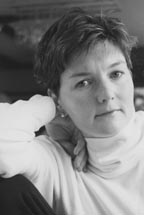|
Web Exclusives: Alumni Spotlight October 6, 2004:
Speaking
out on hate crimes By Gladys Um *03 A former hate-crime prosecutor in Maine, Peggy Moss ’88 had spent years working with children and adults who were harassed, threatened, or assaulted on the basis of race, ethnicity, religion, gender, sexual orientation, disability, or class. Drawing on her experience defending and protecting victims of violence, Moss wrote a children’s book, Say Something, published by Tilbury House last May, about a girl who sees her classmates getting bullied and teased on a daily basis at her elementary school. The girl doesn’t say or do anything until, one day, she’s also taunted while sitting alone in the cafeteria. While her peers watch in silence, secretly feeling sorry for her but afraid to speak out on her behalf, it occurs to the protagonist that these bystanders could discourage the bullies if they summoned up the courage to “say something.” The book is based on a story shared by a participant at a workshop Moss gave on preventing hate crimes in schools. Moss says she hopes Say Something will “start a dialogue between parents and kids about what’s really going on,” and will “encourage kids to bear in mind that they are in the best position to make bullying stop in their schools.” Several schools and a teachers’ college have invited Moss to speak to their students. After reading her short picture book to a group of children, Moss leads them in a series of exercises to help them think about harassment in their schools and what they can do to stop it. Say Something includes a list of resources and practical tips on how to deal with bullying, for both victims and bystanders. Among her suggestions are: report it to a teacher; assert yourself instead of keeping quiet; and “make teasing UN-cool” by not laughing at your peers’ mean jokes. As assistant attorney general in the civil rights unit in Maine, Moss saw first hand the deep emotional and often physical trauma that bullying inflicts on children. She talked with students who could not concentrate in class because their thoughts were entirely occupied with getting to the next class without encountering their tormentors. She met children who had gotten sick from avoiding trips to the bathroom, where bullies would target them. She saw victims drop out of school or resort to self-mutilation as a cry for help. Eventually, Moss decided to develop more proactive solutions to hate crime. “By the time a case came to my desk,” she says, “the damage had already been done. A kid had been beaten. Someone was terrified in his or her own community.” So in 2000, she resigned from her position as prosecutor to work as associate director at the Center for the Prevention of Hate Violence in Portland, Maine, for which she conducts workshops and gives speeches on how to prevent hate crime in schools. In 2002 she enrolled in an M.F.A. fiction program and started to develop fiction out of her experiences. Moss, who has been writing since her youth and took her first writing class at Princeton with John McPhee ’53, earned her degree at the University of Southern Maine last July. McPhee had given her advice on pursuing a writer career: “don’t write until doing anything else feels intolerable.” She pretty much followed McPhee’s advice, practicing law until that become intolerable. She credits the TigerNet Writers List, an online community of literary-minded Princeton alumni, with giving her the moral support she needed to pursue her dream of becoming a writer. Moss continues to consult to the Center for the Prevention of
Hate Violence and says, “hate violence informs everything
I write.” Gladys Um is a freelance writer in Plainsboro, New Jersey.
|
||

